 We all want to be happy. Yet, at the same time, we’re constantly doing things that stand in the way of our own happiness. That is, in many ways, we’re our own happiness saboteurs.
We all want to be happy. Yet, at the same time, we’re constantly doing things that stand in the way of our own happiness. That is, in many ways, we’re our own happiness saboteurs.
The good news is that once you become aware of the actions that you’re taking on a regular basis which get in the way of your happiness, you can make the choice to stop doing them. Below you’ll discover 12 things to stop doing if you want to be happy.
 1. Stop Being a Victim. In order to be happy, you have to stop acting like a victim. Victims blame others for the predicaments that they find themselves in, they feel powerless to change their circumstances, and they’re constantly waiting for someone or something to come rescue them.
1. Stop Being a Victim. In order to be happy, you have to stop acting like a victim. Victims blame others for the predicaments that they find themselves in, they feel powerless to change their circumstances, and they’re constantly waiting for someone or something to come rescue them.
Move from seeing yourself as a victim to seeing yourself as a creator, and then start creating the life that you want. Here are three blog posts that I wrote which will help you to shift your mindset from that of a victim to that of a creator:
 2. Stop If-Then Thinking. Srikumar S. Rao, Ph.D., is a former business school professor and the author of several books, including “Happiness at Work: Be Resilient, Motivated, and Successful No Matter What”.
2. Stop If-Then Thinking. Srikumar S. Rao, Ph.D., is a former business school professor and the author of several books, including “Happiness at Work: Be Resilient, Motivated, and Successful No Matter What”.
Dr. Rao explains that most people have a long list of things that they believe have to happen before they can be happy. He calls this “if-then” thinking. Here are some examples:
- If I get a promotion, then I’ll be happy.
- If I lose weight, then I’ll be happy.
- If I find someone to share my life with, then I’ll be happy.
He argues that you need to stop insisting that things go a certain way before you can be happy. Dr. Rao adds that happiness is something that’s innately within you. Your happiness is not contingent on anything else.
 3. Stop Being a Pessimist. In her book, “The How of Happiness”, Sonja Lyubomirsky, Ph.D.–professor of psychology at the University of California, Riverside–, lays out 12 happiness enhancing strategies. One of these is cultivating optimism.
3. Stop Being a Pessimist. In her book, “The How of Happiness”, Sonja Lyubomirsky, Ph.D.–professor of psychology at the University of California, Riverside–, lays out 12 happiness enhancing strategies. One of these is cultivating optimism.
Dr. Lyubomirsky recommends that you keep a journal in which you imagine and write about your best possible future. In addition, she indicates that you should get into the habit of looking for the bright side to every situation.
Happy people don’t pretend that everything is fine even when it isn’t. However, instead of dwelling on what they lost or on what went wrong they quickly realize that things could have been worse, and they start looking for the silver lining to whatever situation they find themselves in.
In addition, instead of telling themselves that nothing will ever change, happy people are hopeful about the future and that things will get better.
 4. Stop Multitasking. When you multitask you’re trying to do several things at once, which means that your attention is divided and you’re not fully focused on anything that you’re doing. However, in order to be happy you have to place all of your attention on the task you’re involved in. That is, whatever you’re doing–even if it’s just washing the dishes–you should be fully involved with the act.
4. Stop Multitasking. When you multitask you’re trying to do several things at once, which means that your attention is divided and you’re not fully focused on anything that you’re doing. However, in order to be happy you have to place all of your attention on the task you’re involved in. That is, whatever you’re doing–even if it’s just washing the dishes–you should be fully involved with the act.
Harvard researchers conducted a study involving 2,200 people. Participants in the study were asked at random times how they were feeling. The researchers found that what mattered in determining how happy the participants felt at any given moment in time was not what they were doing, but rather the degree of attention that they were bringing to the task at hand.
 5. Stop Chasing Perfection. Tal Ben-Shahar, Ph.D., once taught the most popular course at Harvard University. It was a course on happiness. In his book, “The Pursuit of Perfect: How to Stop Chasing Perfection and Start Living a Richer, Happier Life”, Dr. Ben-Shahar explains that chasing perfection may be the number one internal obstacle to finding happiness.
5. Stop Chasing Perfection. Tal Ben-Shahar, Ph.D., once taught the most popular course at Harvard University. It was a course on happiness. In his book, “The Pursuit of Perfect: How to Stop Chasing Perfection and Start Living a Richer, Happier Life”, Dr. Ben-Shahar explains that chasing perfection may be the number one internal obstacle to finding happiness.
Dr. Ben-Shahar argues that instead of being a perfectionist, you should aim for being an optimilist. Here’s the difference between the two:
- Perfectionism is the neurotic belief that everything about you and your environment has to be perfect.
- On the other hand, Optimilism is setting high standards which are grounded in reality; accepting that failure is a natural part of the process of achieving goals; and knowing how to find value and satisfaction in an imperfect performance.
While perfection is a destination at which you’ll never arrive, optimilism is about focusing on the journey and being happy with doing your best as you strive to achieve your goals.
 6. Stop Dwelling on the Past. Feeling haunted by the past, and focusing on personal experiences that were aversive or unpleasant is toxic.
6. Stop Dwelling on the Past. Feeling haunted by the past, and focusing on personal experiences that were aversive or unpleasant is toxic.
Rehearsing old dissatisfactions leads to feelings of anger, shame, and regret. These emotions, in turn, can prevent you from taking the steps necessary to create joy in the present. Release the ghosts of the past so that you can stop robbing yourself of present opportunities.
 7. Stop Living in the Future. While thinking of the future is fundamental to well-being and positive functioning, focusing on future goals and rewards at the expense of the present is not conducive to happiness. People who have an excessive future orientation have a tendency to do the following:
7. Stop Living in the Future. While thinking of the future is fundamental to well-being and positive functioning, focusing on future goals and rewards at the expense of the present is not conducive to happiness. People who have an excessive future orientation have a tendency to do the following:
- They tend to be workaholics;
- They tend to neglect their friends and family:
- They refuse to take time for the occasional self-indulgence;
- They tend to put their happiness “on hold” while they strive for something which they think will make them happy in the future; and so on.
The best approach is to balance enjoying the here-and-now with working toward building a good future for yourself. The activities which are most conducive to happiness are those which combine present and future gains.
As an illustration, going to a dance-based exercise class which you enjoy provides the present gain of the pleasure that you get from taking the class, with the future gain of fitness and health.
 8. Stop Holding Grudges. You’ve probably heard all of the sayings related to holding grudges. Here are two of my favorites:
8. Stop Holding Grudges. You’ve probably heard all of the sayings related to holding grudges. Here are two of my favorites:
- “Holding a grudge is like drinking poison and waiting for the other person to die.” – William Shakespeare
- “Hanging onto resentment is letting someone you despise live rent-free in your head.” — Ann Landers
Letting go of grudges—or forgiving—doesn’t mean that what the other person did was OK. It just means that you’ve decided that you will no longer allow it to interfere with your happiness.
 9. Stop Focusing On Your Weaknesses. Instead of focusing on your weaknesses, play to your strengths. Research done in the area of positive psychology has shown that in order to be happy you need to identify your strengths–the things that you love to do and that you’re naturally good at–, and then put them into practice as often as you can. Here are the benefits of focusing on your strengths:
9. Stop Focusing On Your Weaknesses. Instead of focusing on your weaknesses, play to your strengths. Research done in the area of positive psychology has shown that in order to be happy you need to identify your strengths–the things that you love to do and that you’re naturally good at–, and then put them into practice as often as you can. Here are the benefits of focusing on your strengths:
- People who focus on their strengths are happier;
- They’re more confident and have higher levels of self-esteem;
- They have more energy;
- They are more resilient;
- They are more engaged; and
- They are more likely to achieve their goals.
Although you shouldn’t ignore your weaknesses, especially those weaknesses which could hold you back, it’s a question of emphasis. Manage your weakness but focus on your strengths.
 10. Stop Waiting for the Right Time. When are you going back to school to get that degree you’ve always wanted? When are you going to take that writer’s workshop you’re always talking about? When are you going to start your own business? When are you going to take some time off to travel?
10. Stop Waiting for the Right Time. When are you going back to school to get that degree you’ve always wanted? When are you going to take that writer’s workshop you’re always talking about? When are you going to start your own business? When are you going to take some time off to travel?
A lot of people would answer the questions above with the following: “Well, now’s not the right time.” People who are always waiting for the right time are stuck in a perpetual limbo of believing that the “right time” will come. And limbo is not a happy place.
The reality is that there is no such thing as “the right time”. The only time that you have is now. Beginning makes it the right time.
 11. Stop Living Mindlessly. Ellen Langer, Ph.D., is a professor of psychology and author of the book “Mindfulness”. Dr. Langer’s research shows that mindfulness is one of the main keys to happiness. She defines mindfulness as “the simple act of actively noticing new things and drawing new distinctions.”
11. Stop Living Mindlessly. Ellen Langer, Ph.D., is a professor of psychology and author of the book “Mindfulness”. Dr. Langer’s research shows that mindfulness is one of the main keys to happiness. She defines mindfulness as “the simple act of actively noticing new things and drawing new distinctions.”
Dr. Langer explains that the process of drawing new distinctions produces a feeling of engagement. She adds that “research has shown that mindfulness is figuratively and literally enlivening. It’s the way you feel when you’re feeling passionate.”
One way to be more mindful is to question procedures and regulations. Instead of simply accepting that “this is the way it’s always been done”, ask yourself if there’s a better way. Relinquish your preconceived mindsets, notice what you’re doing, and then act based on your new observations.
 12. Stop Holding Out for the Big Stuff. Happy people notice the small things: when the barista at the coffeehouse makes a heart shape on the cappuccino foam; the little kid in the park gleefully chasing a soccer ball; little acts of courtesy from strangers, like holding the elevator; and so on.
12. Stop Holding Out for the Big Stuff. Happy people notice the small things: when the barista at the coffeehouse makes a heart shape on the cappuccino foam; the little kid in the park gleefully chasing a soccer ball; little acts of courtesy from strangers, like holding the elevator; and so on.
The big things in life–weddings, graduations, job promotions, the birth of a child–are few and far between. Life is made up of small moments. Appreciating easy-to-come-by pleasures and finding joy in the simple things is associated with a feeling of overall gladness. So stop holding out for the big stuff and start counting small blessings.
Conclusion
In order to be happy and live your best life you have to stop doing the things that get in the way of your happiness. You can start with the 12 things explained above.


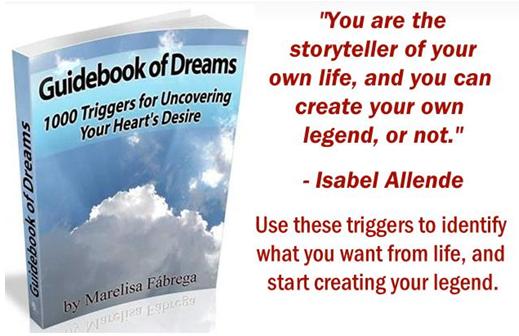
Related Posts:
- Keys to Success – B.C. Forbes
- 32 Bits of Wisdom from William Clement Stone
- 32 Timeless Success Principles from Napoleon Hill
- 72 of the Best Success Quotes
- 49 Snippets of Wisdom on How to Succeed
Did you enjoy this article? Subscribe to “Daring to Live Fully” by RSS or by email, and get free updates.

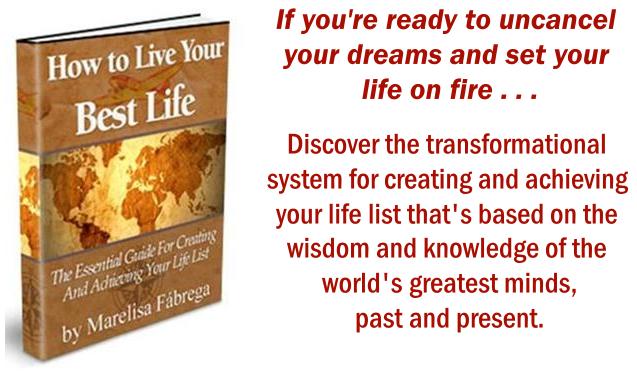
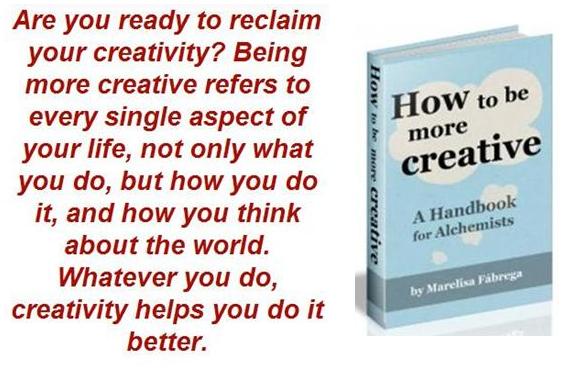

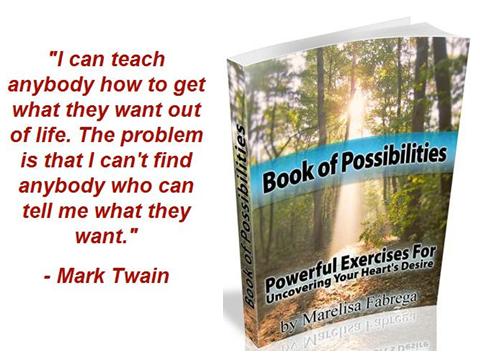


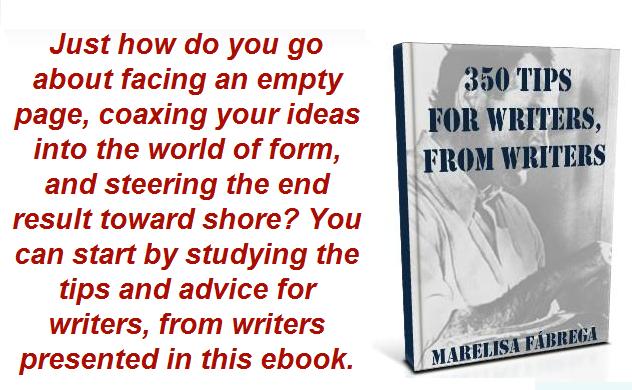
 Marelisa Fabrega is a lawyer and entrepreneur. She holds a Bachelor of Science in Business Administration from Georgetown University in Washington, D.C., as well as a Juris Doctor from the Georgetown University Law Center. You can learn more about her
Marelisa Fabrega is a lawyer and entrepreneur. She holds a Bachelor of Science in Business Administration from Georgetown University in Washington, D.C., as well as a Juris Doctor from the Georgetown University Law Center. You can learn more about her 






Comments on this entry are closed.
I enjoyed this article. What a way to start the week. I realized that one issue in victim hood is surrounding yourself or pouring your energy and strengths into a bowl of negativity.
An example: with all the opportunities to reach out and improve the world, many social media avenues spend time arguing and blaming political leaders or religions for all the major problems in the world. Yes, politics and religion play a part in the structure of society, but we still need to focus on being the change we want to see.
I think many people become disheartened and demoralized with a 24 hour news cycle along with socializing online around the negativity of politics. One of the reasons I love what you are doing with this blog: is because you continue to help people keep hope alive.
Thank you for your presence and light in the world.
Hi Sandy: What a kind comment; thank you. I agree that instead of reading all day long about what’s wrong with the world and blaming world leaders, we should place our attention on what we can do to make the world at least a little better. If everyone did that this would be a better world indeed.